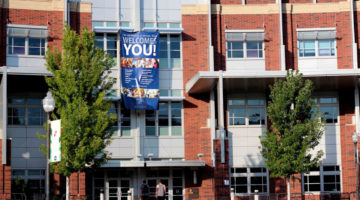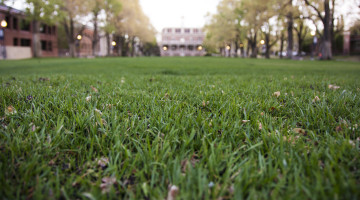
Blake Nelson/Nevada Sagebrush
Students pass by signs for candidates in the Associated Students of the University of Nevada election in front of the Mathewson-IGT Knowledge Center on Monday, Feb. 29. The final debate before the primary elections will take place inside the Wells Fargo Auditorium in the Knowledge Center on Tuesday, March 1.
By Jacob Solis
With elections for executive positions within the Associated Students of the University of Nevada only a week away, the campaign trail is heating up.
From Tuesday to Thursday of last week, candidates from every college took to the stage in the Wells Fargo Auditorium inside the Mathewson-IGT Knowledge Center for a series of debates. The candidates answered a wide range of questions, from their own campaign platforms to questions on the campus smoking ban to questions on diversity at the University of Nevada, Reno.
The presidential and vice presidential candidates take to the debate stage on Tuesday, March 1. ASUN Elections Chair Dalton Mack couldn’t comment when it came to what the potential questions might be, but he was able to promise that the questions will be hard-hitting.
“It will be pretty groundbreaking,” Mack said. “There’ll be questions that are really gonna make the candidates think. [The debate], after all, is for the president and the vice president. I’d say they better bring their A-game.”
Mack also said that the questions will cover a wide range of topics, from what he called “pretty basic” questions to questions on the future of the university itself that should keep all the candidates on their proverbial toes. The debate will start at 7:30 p.m., inside of the Wells Fargo Auditorium.
While Mack said the campaign has been remarkably smooth thus far, it hasn’t been without a few hitches. Both Mack and ASUN Attorney General Ryan Hood have acknowledged that charges related to election violations are in the works, but since they haven’t been made public yet, neither could comment on the matter.
Even so, Hood explained in an email to The Nevada Sagebrush that rules for the election are set in stone in the Statutes of the Associated Students, and that every candidate is told the rules before campaigning even starts.
“These rules make for a fair and fun campaign season and environment,” Hood said. “The rules also align with university policy and buildings and grounds stipulations to ensure campaigns aren’t disruptive or destructive to the campus.”
Hood added that violations of these rules are usually addressed via warnings, but repeat offenders or particularly severe offenses receive official charges.
These charges are reviewed by the ASUN judicial council, a group of five justices appointed by the ASUN president, that decides whether or not the charge is valid.
If the charge ends up being valid, a fine is levied against the candidate. That fine comes out of a $50 deposit made before they start campaigning, and if a candidate exceeds $50 in fines, then they’re dropped from the race.
Charges filed to the judicial council are relatively rare, and if they are filed, they often pertain to election violations. For instance, three of the five total charges filed last year had to do with the election and six charges filed in 2014
However, even with charges, Mack remains upbeat about the election in general, especially regarding the number of candidates in the race.
Mack added that he hopes for record turnout this year for the general election — 25 percent — to match the record number of candidates. Mack’s goal is a 5 percent increase over last year’s turnout of 20 percent, itself a record.
He hopes that candidate outreach to clubs, organizations and classes around campus will drive enough interest in the elections themselves to push participation up in addition to distributing media across campus to remind students to vote.
Turnout estimates for the primary are slightly more modest because though primaries have been held for ASUN elections in 11 out of the last 16 years, the last time UNR saw one was 2013. Even so, turnout was only slightly lower that year in the primary, with 13 percent of students turning out to vote versus 14 percent.
Students who wish to vote in this year’s elections can do so on online through WebCampus, or in person at the Blue Fish Bowl on the second floor of the Joe Crowley Student Union.
Jacob Solis can be reached at jsolis@sagebrush.unr.edu and Twitter @TheSagebrush.











